Common Ways to Say Sorry in Chinese
Gurulango will share with you common ways to say sorry in Chinese, help you to learn Chinese in natural way.
对不起 (duì bu qǐ) – I’m Sorry

- Meaning: Direct and serious apology.
- Use: When you make a mistake or offend someone.
- Examples:
- 对不起,昨天是我错了。(Duìbuqǐ, zuòtiān shì wǒ cuò le.) — Sorry, it was my fault yesterday.
- 对不起,打扰你了。(Duìbuqǐ, dǎrào nǐ le.) — Sorry to bother you.
- 对不起,我来晚了。(Duìbuqǐ, wǒ lái wǎn le.) — Sorry, I’m late.
- 对不起,我没有听清楚。(Duìbuqǐ, wǒ méiyǒ tīng qīngchǔ.) — Sorry, I didn’t hear clearly.
- 对不起,我不是故意的。(Duìbuqǐ, wǒ bù shì gùyì de.) — Sorry, I didn’t do it on purpose.
不好意思 (bù hǎo yì si) – Excuse Me / Sorry
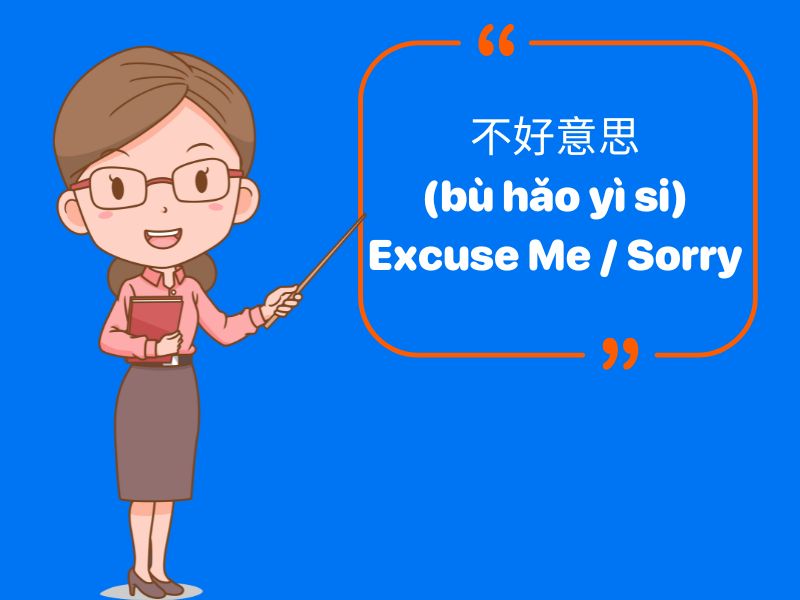
- Meaning: Light or polite apology.
- Use: For minor mistakes, bumping into someone, or interrupting.
- Examples:
- 不好意思,我打断你了。(Bù hǎo yìsi, wǒ dǎduàn nǐ le.) — Sorry for interrupting you.
- 不好意思,请问一下。(Bù hǎo yìsi, qǐngwèn yīxià.) — Excuse me, may I ask something?
- 不好意思,我路过了。(Bù hǎo yìsi, wǒ lùguò le.) — Sorry, I passed the place.
- 不好意思,我不对了。(Bù hǎo yìsi, wǒ bù duì le.) — Sorry, I was wrong.
- 不好意思,请让一下。(Bù hǎo yìsi, qǐng ràng yīxià.) — Excuse me, please let me pass.
抱歉 (bào qiàn) – I Apologize
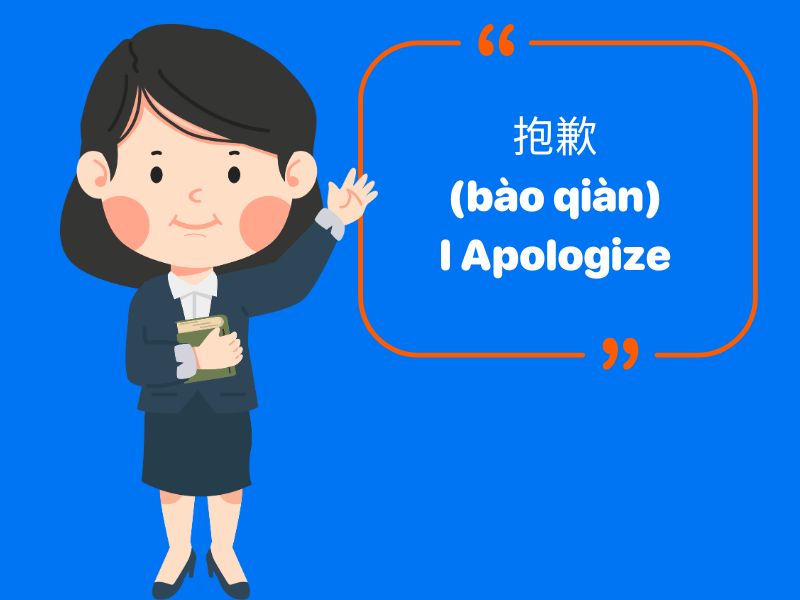
- Meaning: Formal and sincere apology.
- Use: Written apologies, business or official situations.
- Examples:
- 我表示深切的抱歉。(Wǒ biǎnshì shēnqiē de bàoqiàn.) — I express my deepest apologies.
- 对日前的失败我感到抱歉。(Duì rìqián de shībaì wǒ gǎn dào bàoqiàn.) — I apologize for the recent failure.
- 非常抱歉,我们将修复问题。(Fēicháng bàoqiàn, wǒmen jiāng xiūfù wèntí.) — We sincerely apologize and will fix the issue.
- 我为经理的失误表示抱歉。(Wǒ wèi jīnglǐ de shīwù biǎnshì bàoqiàn.) — I apologize on behalf of the manager’s mistake.
- 我们真诚地抱歉给您带来了不便。(Wǒmen zhēnchéng de bàoqiàn gěi nín dài lái le bùbiàn.) — We sincerely apologize for the inconvenience caused.
失礼了 (shī lǐ le) – Pardon Me / I Was Rude
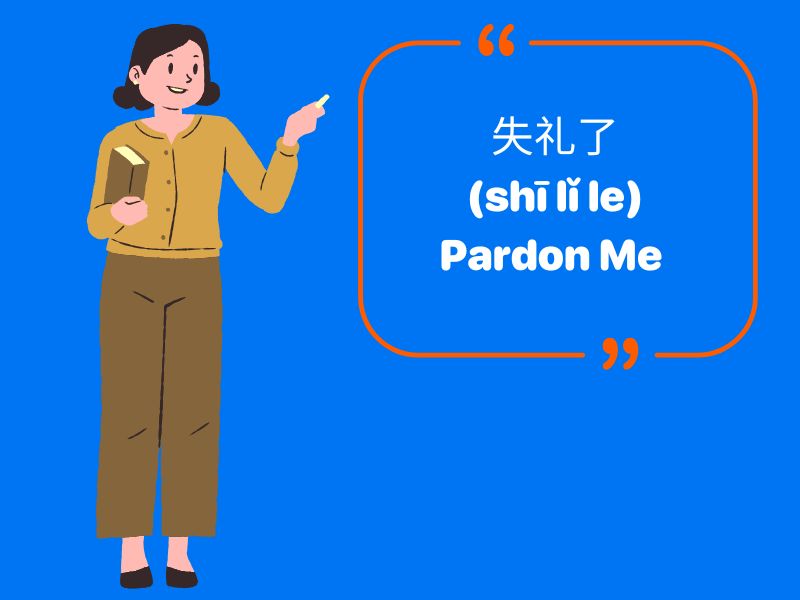
- Meaning: Polite and traditional phrase.
- Use: In formal or traditional settings to express humility.
- Examples:
- 失礼了,打扰您的时间。(Shī lǐ le, dǎrǎo nín de shíjiān.) — Pardon me, I interrupted your time.
- 失礼了,忘记自我介绍了。(Shī lǐ le, wàngjì zìwǒ jièshào le.) — Sorry, I forgot to introduce myself.
- 失礼了,我太激动了。(Shī lǐ le, wǒ tài jīdòng le.) — Pardon me, I got too excited.
- 失礼了,请您先说。(Shī lǐ le, qǐng nín xiān shuō.) — Pardon me, please go ahead.
- 失礼了,我没有听到你的话。(Shī lǐ le, wǒ méiyǒu tīngdào nǐ de huà.) — Sorry, I didn’t hear what you said.
请原谅 (qǐng yuán liàng) – Please Forgive Me
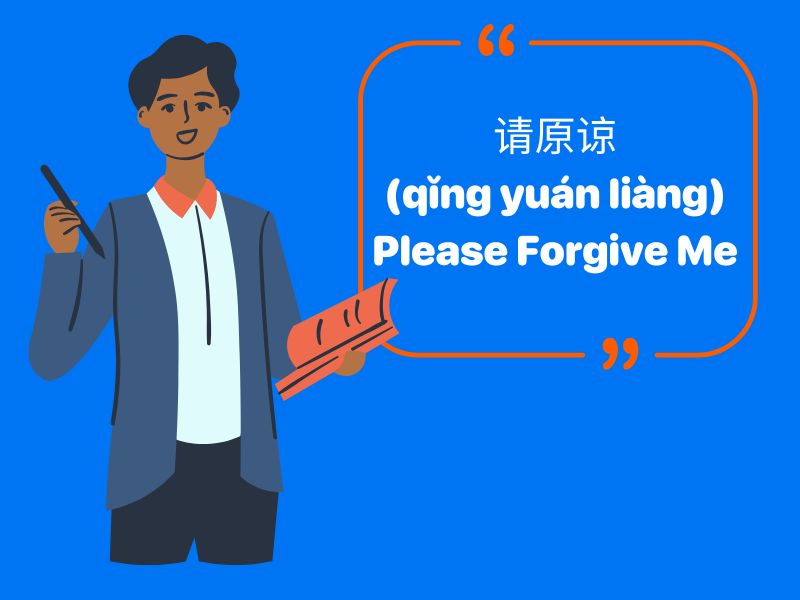
- Meaning: A gentle, respectful way to ask for forgiveness.
- Use: When you need sincere forgiveness from someone.
- Examples:
- 请原谅我的无礼。(Qǐng yuánliàng wǒ de wúlǐ.) — Please forgive my rudeness.
- 请原谅我说话太直接了。(Qǐng yuánliàng wǒ shuōhuà tài zhíjiē le.) — Please forgive me for being too direct.
- 请原谅我忘记了你的生日。(Qǐng yuánliàng wǒ wàngjì le nǐ de shēngrì.) — Sorry I forgot your birthday.
- 请原谅我没有及时回复。(Qǐng yuánliàng wǒ méiyǒu jíshí huífù.) — Please forgive me for not replying in time.
- 请原谅我造成的困扰。(Qǐng yuánliàng wǒ zàochéng de kùnrǎo.) — Please forgive the trouble I caused.
See also: Thank you in Chinese
Contextual Usage of Apology Phrases

Different apology phrases suit various situations, from casual to formal.
Formal vs. Informal Situations
- 工作会议中使用“抱歉”更为正式。(Gōngzuò huìyì zhōng shǐyòng “bàoqiàn” gèng wéi zhèngshì.) — In business meetings, “bàoqiàn” is more formal.
- 对朋友说“对不起”或“不好意思”就足够了。(Duì péngyǒu shuō “duìbuqǐ” huò “bùhǎoyìsi” jiù zúgòu le.) — Saying “sorry” or “excuse me” is enough for friends.
- 给客户写信时建议使用“请原谅”。(Gěi kèhù xiěxìn shí jiànyì shǐyòng “qǐng yuánliàng”.) — Use “please forgive” in customer emails.
- 和家人道歉常用“对不起”。(Hé jiārén dàoqiàn cháng yòng “duìbuqǐ”.) — “Duìbuqǐ” is often used for family.
- 与陌生人交流时可用“不好意思”。(Yǔ mòshēngrén jiāoliú shí kě yòng “bùhǎoyìsi”.) — Use “bùhǎoyìsi” with strangers.
Severity of the Offense
- 弄坏别人东西要用“对不起”或“抱歉”。(Nòng huài biérén dōngxi yào yòng “duìbuqǐ” huò “bàoqiàn”.) — Use “sorry” or “apologize” when damaging something.
- 打断讲话可说“不好意思”。(Dǎduàn jiǎnghuà kě shuō “bùhǎoyìsi”.) — Say “excuse me” when interrupting.
- 严重误会时需说“请原谅”。(Yánzhòng wùhuì shí xū shuō “qǐng yuánliàng”.) — Use “please forgive” for major misunderstandings.
- 迟到五分钟可用“对不起”。(Chídào wǔ fēnzhōng kě yòng “duìbuqǐ”.) — Say “sorry” for being 5 minutes late.
- 粗心大意造成麻烦时应正式道歉。(Cūxīn dàyì zàochéng máfan shí yīng zhèngshì dàoqiàn.) — Use formal apology for careless trouble.
Cultural Sensitivity
- 中国人重视态度胜于语言。(Zhōngguó rén zhòngshì tàidù shèng yú yǔyán.) — Chinese people value attitude over words.
- 不宜频繁说“对不起”,显得不真诚。(Bù yí pínfán shuō “duìbuqǐ”, xiǎnde bù zhēnchéng.) — Over-apologizing may seem insincere.
- 面子文化让道歉更具象征意义。(Miànzi wénhuà ràng dàoqiàn gèng jù xiàngzhēng yìyì.) — Saving face affects apology culture.
- 道歉时语气和表情要自然诚恳。(Dàoqiàn shí yǔqì hé biǎoqíng yào zìrán chéngkěn.) — Use natural tone and expressions.
- 在社交平台表达歉意也需礼貌得体。(Zài shèjiāo píngtái biǎodá qiànyì yě xū lǐmào détǐ.) — Apologies on social media should be polite.
Apologizing in Business Contexts
- 会议迟到可说“非常抱歉”。(Huìyì chídào kě shuō “fēicháng bàoqiàn”.) — Say “I’m very sorry” when late to a meeting.
- 项目延期可用“我们深表歉意”。(Xiàngmù yánqī kě yòng “wǒmen shēn biǎo qiànyì”.) — Say “we deeply apologize” for project delays.
- 回复客户邮件可写“请您见谅”。(Huífù kèhù yóujiàn kě xiě “qǐng nín jiànliàng”.) — Write “please forgive us” in client emails.
- 公司公告中常见“对此我们深感抱歉”。(Gōngsī gōnggào zhōng chángjiàn “duì cǐ wǒmen shēngǎn bàoqiàn”.) — Say “we sincerely apologize” in company notices.
- 发送礼品表达补偿也是商务道歉常见做法。(Fāsòng lǐpǐn biǎodá bǔcháng yě shì shāngwù dàoqiàn chángjiàn zuòfǎ.) — Sending a gift as compensation is common in business apologies.
Non-Verbal Apologies
- 微笑致意加“失礼了”。(Wēixiào zhìyì jiā “shīlǐ le”.) — Smile and say “pardon me.”
- 递上一张道歉卡片。(Dì shàng yī zhāng dàoqiàn kǎpiàn.) — Hand over an apology card.
- 鞠躬表达歉意(尤其在正式场合)。(Jūgōng biǎodá qiànyì (yóuqí zài zhèngshì chǎnghé).) — Bow as an apology, especially in formal settings.
- 赠送小礼物表示诚意。(Zèngsòng xiǎo lǐwù biǎoshì chéngyì.) — Give a small gift to show sincerity.
- 用温和语气配合道歉词更有诚意。(Yòng wēnhé yǔqì pèihé dàoqiàn cí gèng yǒu chéngyì.) — A gentle tone adds sincerity to your apology.
Responding to Apologies in Chinese
Knowing how to respond to other people’s apologies shows understanding and emotional intelligence too.
没关系 (méi guān xi) – It’s Okay
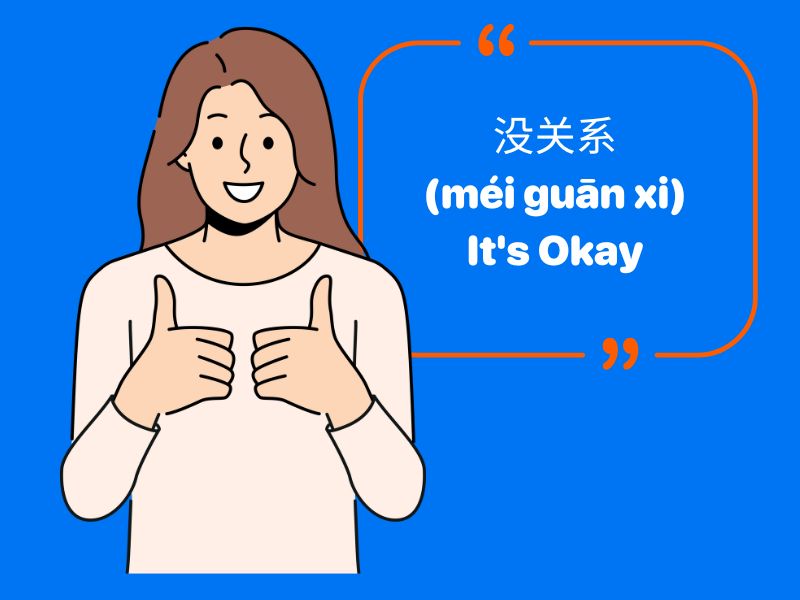
- 没关系,谁都会犯错。(Méi guānxi, shuí dōu huì fàncuò.) — It’s okay, everyone makes mistakes.
- 没关系,我没事。(Méi guānxi, wǒ méi shì.) — It’s okay, I’m fine.
- 没关系,不用太在意。(Méi guānxi, bù yòng tài zàiyì.) — It’s okay, don’t worry too much.
- 没关系,你不是故意的。(Méi guānxi, nǐ bù shì gùyì de.) — It’s okay, you didn’t mean it.
- 没关系,咱们继续吧。(Méi guānxi, zánmen jìxù ba.) — It’s okay, let’s move on.
没事 (méi shì) – It’s Nothing
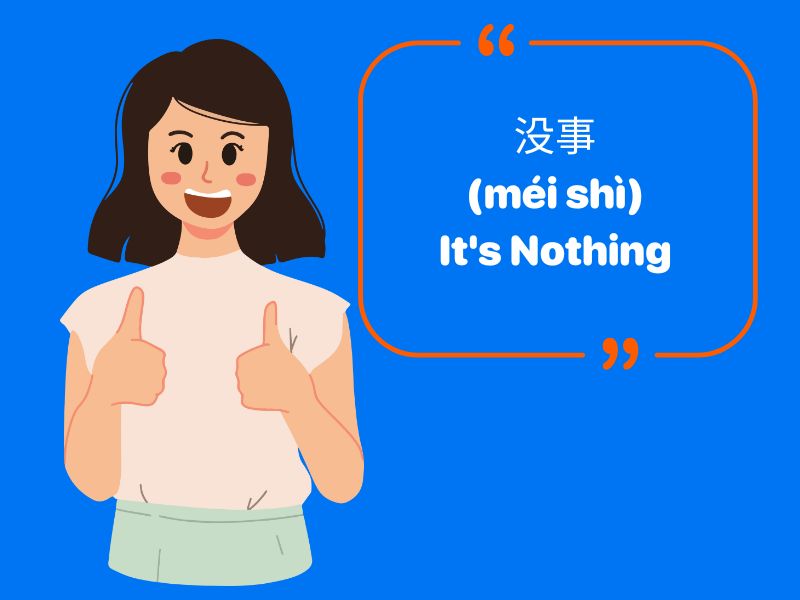
- 没事啦,我真的不介意。(Méi shì la, wǒ zhēn de bù jièyì.) — No worries, I really don’t mind.
- 没事,不是什么大事。(Méi shì, bù shì shénme dà shì.) — It’s nothing serious.
- 没事,以后注意就好了。(Méi shì, yǐhòu zhùyì jiù hǎo le.) — It’s okay, just be careful next time.
- 没事,别放在心上。(Méi shì, bié fàng zài xīn shàng.) — It’s nothing, don’t take it to heart.
- 没事,还好我没受伤。(Méi shì, hái hǎo wǒ méi shòushāng.) — It’s fine, luckily I wasn’t hurt.
不用放在心上 (bù yòng fàng zài xīn shàng) – Don’t take it to heart / Don’t worry about it

- 放轻松,不用放在心上。(Fàng qīngsōng, bù yòng fàng zài xīn shàng.) — Relax, don’t worry about it.
- 我了解你,不用放在心上。(Wǒ liǎojiě nǐ, bù yòng fàng zài xīn shàng.) — I understand you, don’t let it bother you.
- 真的没什么,不用放在心上。(Zhēn de méi shénme, bù yòng fàng zài xīn shàng.) — It’s really nothing, don’t take it to heart.
- 别担心,不用放在心上。(Bié dānxīn, bù yòng fàng zài xīn shàng.) — Don’t worry, it’s nothing.
- 事情过去了,不用再想了。(Shìqíng guòqù le, bù yòng zài xiǎng le.) — It’s over, don’t dwell on it.
没什么大不了 (méi shénme dà bù liǎo) – It’s not a big deal / It’s nothing serious

- 这没什么大不了的。(Zhè méi shénme dà bù liǎo de.) — This is no big deal.
- 真没事,没什么大不了。(Zhēn méi shì, méi shénme dà bù liǎo.) — Really, it’s nothing serious.
- 小问题而已,没什么大不了。(Xiǎo wèntí éryǐ, méi shénme dà bù liǎo.) — Just a small issue, not a big deal.
- 别放在心上,没什么大不了。(Bié fàng zài xīn shàng, méi shénme dà bù liǎo.) — Don’t worry, it’s not a big deal.
- 我可以理解,没什么大不了。(Wǒ kěyǐ lǐjiě, méi shénme dà bù liǎo.) — I understand, it’s no big deal.
谢谢你的道歉 (xiè xiè nǐ de dào qiàn) – Thank you for your apology

- 谢谢你的道歉,我接受了。(Xièxiè nǐ de dàoqiàn, wǒ jiēshòu le.) — Thank you for your apology, I accept it.
- 感谢你诚恳的道歉。(Gǎnxiè nǐ chéngkěn de dàoqiàn.) — I appreciate your sincere apology.
- 我知道你在意,谢谢你的道歉。(Wǒ zhīdào nǐ zàiyì, xièxiè nǐ de dàoqiàn.) — I know you care, thank you for the apology.
- 你的道歉让我很感动。(Nǐ de dàoqiàn ràng wǒ hěn gǎndòng.) — Your apology touched me.
- 谢谢你的道歉,事情就过去了。(Xièxiè nǐ de dàoqiàn, shìqíng jiù guòqù le.) — Thanks for your apology, it’s all in the past now.
Once you’ve mastered how to say “sorry” in Chinese, it’s a good idea to broaden your vocabulary with other everyday expressions. Start with simple but essential phrases like Good Morning and Goodbye in Chinese to boost your daily conversation skills.
Conclusion
Now that you know how to say “sorry” in Chinese and when to use different apology phrases, you can confidently navigate various social situations in Mandarin. Whether you’re expressing a lighthearted “不好意思 (bù hǎo yì si)” or a more formal “对不起 (duì bu qǐ),” understanding the nuances of apologizing will help you communicate more naturally.
If you want to improve your Chinese even further, use GuruLango to practice vocabulary, master pronunciation, and reinforce your learning with personalized study plans. Plus, don’t forget to follow GuruLango’s blog as well for more expert tips on learning Mandarin!